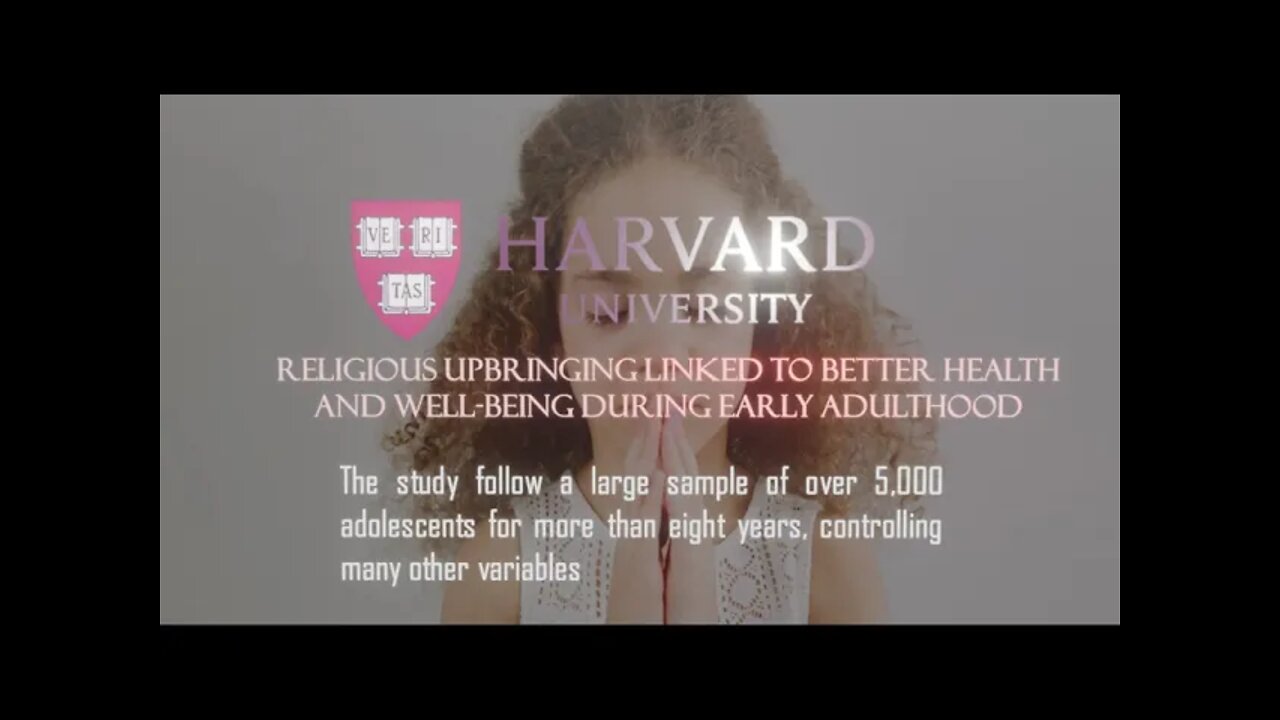Premium Only Content

Religious Upbringing and Health (English Version)
"Compared with no attendance, at least weekly attendance of religious services was associated with greater life satisfaction and positive affect, a number of character strengths."
Sources:
https://www.cambridge.org/core/services/aop-cambridge-core/content/view/358B30940A36C1CD3AFE7991431BA1A9/S2056467819000811a.pdf/religion_and_psychiatry_recent_developments_in_research.pdf
https://academic.oup.com/aje/article/187/11/2355/5094534
Credits Music:
Epic Adventure Cinematic Music | MOVIE by Alex-Productions | https://www.youtube.com/channel/UCx0_M61F81Nfb-BRXE-SeVA
Music promoted by https://www.free-stock-music.com
Creative Commons Attribution 3.0 Unported License
https://creativecommons.org/licenses/by/3.0/deed.en_US
Autres sources:
American Psychiatric Association (2013) Diagnostic and Statistical
Manual of Mental Disorders (5th edn) (DSM-5). American Psychiatric
Publishing.
Bradshaw M, Ellison CG, Fang Q, et al (2014) Listening to religious music
and mental health in later life. Gerontologist, 55: 961–71.
Captari LE, Hook JN, Hoyt W, et al (2018) Integrating clients’religion and
spirituality within psychotherapy: a comprehensive meta-analysis.
Journal of Clinical Psychology, 74: 1938–51.
Croezen S, Avendano M, Burdorf A, et al (2015) Social participation and
depression in old age: a fixed-effects analysis in 10 European countries.
American Journal of Epidemiology, 182: 168–76.
Currier JM, Holland JM, Drescher KD (2015) Spirituality factors in the pre-
diction of outcomes of PTSD treatment for U.S. military veterans. Journal
of Traumatic Stress, 28: 57 –64.
Good M, Hamza C, Willoughby T (2017) A longitudinal investigation of the
relation between non-suicidal self-injury and spirituality/religiosity.
Psychiatry Research, 250: 106–12.
Harris JI, Usset T, Voecks C, et al (2018) Spiritually integrated care for
PTSD: a randomized controlled trial of ‘Building Spiritual Strength’.
Psychiatry Research, 267: 420–8.
Hui CH, Cheung SH, Lam J, et al (2018) Psychological changes during faith
exit: a three-year prospective study. Psychology of Religion and
Spirituality, 10: 103–18.
Jung JH (2018) Childhood adversity, religion, and change in adult mental
health. Research on Aging, 40: 155–79.
Kelly JF, Bergman B, Hoeppner BB, et al (2017) Prevalence and pathways
of recovery from drug and alcohol problems in the United States popula-
tion: implications for practice, research, and policy. Drug and Alcohol
Dependence, 181: 162–9.
Khokhar WA, Dein SL, Qureshi MS, et al (2015) When taking medication
may be a sin: dietary requirements and food laws in psychotropic prescrib-
ing. BJPsych Advances, 21: 425–32.
Kleiman EM, Liu RT (2014) Prospective prediction of suicide in a nationally
representative sample: religious service attendance as a protective factor.
British Journal of Psychiatry, 204: 262–6.
Koenig HG, King DE, Carson VB (2012) Handbook of Religion and Health
(2nd edn). Oxford University Press.
Koenig HG, Pearce MJ, Nelson B, et al (2015) Religious vs. conventional
cognitive-behavioral therapy for major depression in persons with chronic
medical illness. Journal of Nervous and Mental Disease, 203: 243–51.
Koenig HG (2016) Association of religious involvement and suicide. JAMA
Psychiatry, 73: 775–6.
Koenig HG, Ames D, Youssef NA, et al (2018a) Screening for moral injury:
the Moral Injury Symptom Scale–Military Version Short Form. Military
Medicine, 183: e659–65.
Koenig HG (2018b) Religion and Mental Health: Research and Clinical
Applications. Academic Press.
Koenig HG, Youssef NA, Pearce M (2019a) Assessment of moral injury in
Veterans and Active Duty Military with PTSD: a review. Frontiers in
Psychiatry, 10: 443.
Koenig HG, Ames D, Pearce M (2019b) Religion and Recovery from PTSD.
Jessica Kingsley Publishers.
-
 LIVE
LIVE
BonginoReport
7 hours agoAI & The Woke Indoctrination Ruining Childhood - Nightly Scroll w/ Hayley Caronia (Ep.123)
11,579 watching -
 1:17:29
1:17:29
Kim Iversen
4 hours agoTrotskyite Neocons: How MARXISTS Built the Modern GOP
31.3K37 -
 LIVE
LIVE
The Jimmy Dore Show
2 hours agoImmigrant Firefighters ARRESTED By Border Patrol! Zionists CENSORING Wikipedia! w/ Dave DeCamp
4,518 watching -
 LIVE
LIVE
Nerdrotic
2 hours ago $3.19 earnedLet's TACO-bout Take Us North, Hollywood COPE! Cracker Barrel CRACKED! | Friday Night Tights 369
1,743 watching -
 LIVE
LIVE
StoneMountain64
3 hours ago#1 Battlefield Mastery Session with the BOYS
191 watching -
 1:23:45
1:23:45
Roseanne Barr
4 hours agoDeclassifying Presidential Sex Slavery W/ Cathy O’Brien | The Roseanne Barr Podcast #113
81K26 -
 LIVE
LIVE
FusedAegisTV
18 hours agoHollow Knight Silksong Waiting Room ~~ pt. I
80 watching -
 8:37
8:37
Warren Smith - Secret Scholar Society
6 hours agoJesse Lee Peterson EXPOSES How Stupid David Pakman Really Is
10.2K5 -
 44:44
44:44
Scammer Payback
8 hours agoCrazy Confrontation with Hacked Scammer Group
4.56K2 -
 1:09:00
1:09:00
vivafrei
4 hours agoKamala Harris Security Being "Pulled"? Kilmar Wants Trump Admin GAGGED! Fake News GALORE & MORE!
59.4K34